The Role of Ethics in Shaping Effective Education and Social Policy
VerifiedAdded on 2023/06/10
|6
|1112
|219
Essay
AI Summary
This essay provides a comprehensive analysis of the ethical considerations within social policy, specifically focusing on education. It highlights the importance of ethics in public policy, emphasizing how ethical considerations guide policy analysts in creating effective and just policies. The essay discusses key ethical considerations in designing policies, such as avoiding harm, adhering to professional codes, respecting honesty, and ensuring transparency. It also examines the ethical role of leaders in managing conflicting norms and making decisions in the public's best interest. Furthermore, the essay delves into specific ethical considerations within the education sector, including teacher selection, discipline policies, social diversity, and teaching strategies. It concludes by assessing the impact of education policies on various stakeholders, such as schools, students, teachers, and parents, and emphasizes the importance of equal educational opportunities for all. Desklib offers this essay as part of its collection of resources for students.
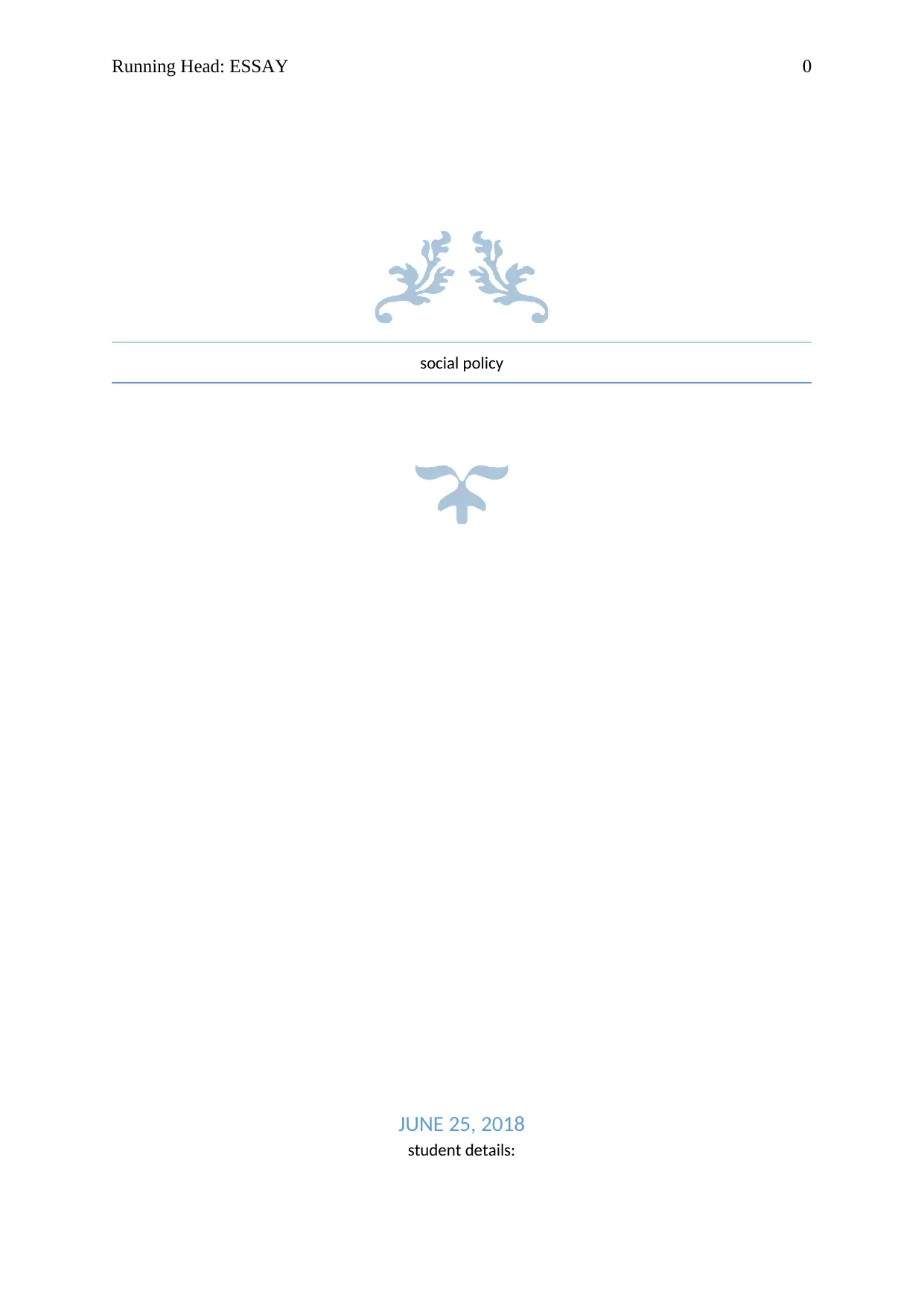
Running Head: ESSAY 0
social policy
JUNE 25, 2018
student details:
social policy
JUNE 25, 2018
student details:
Paraphrase This Document
Need a fresh take? Get an instant paraphrase of this document with our AI Paraphraser
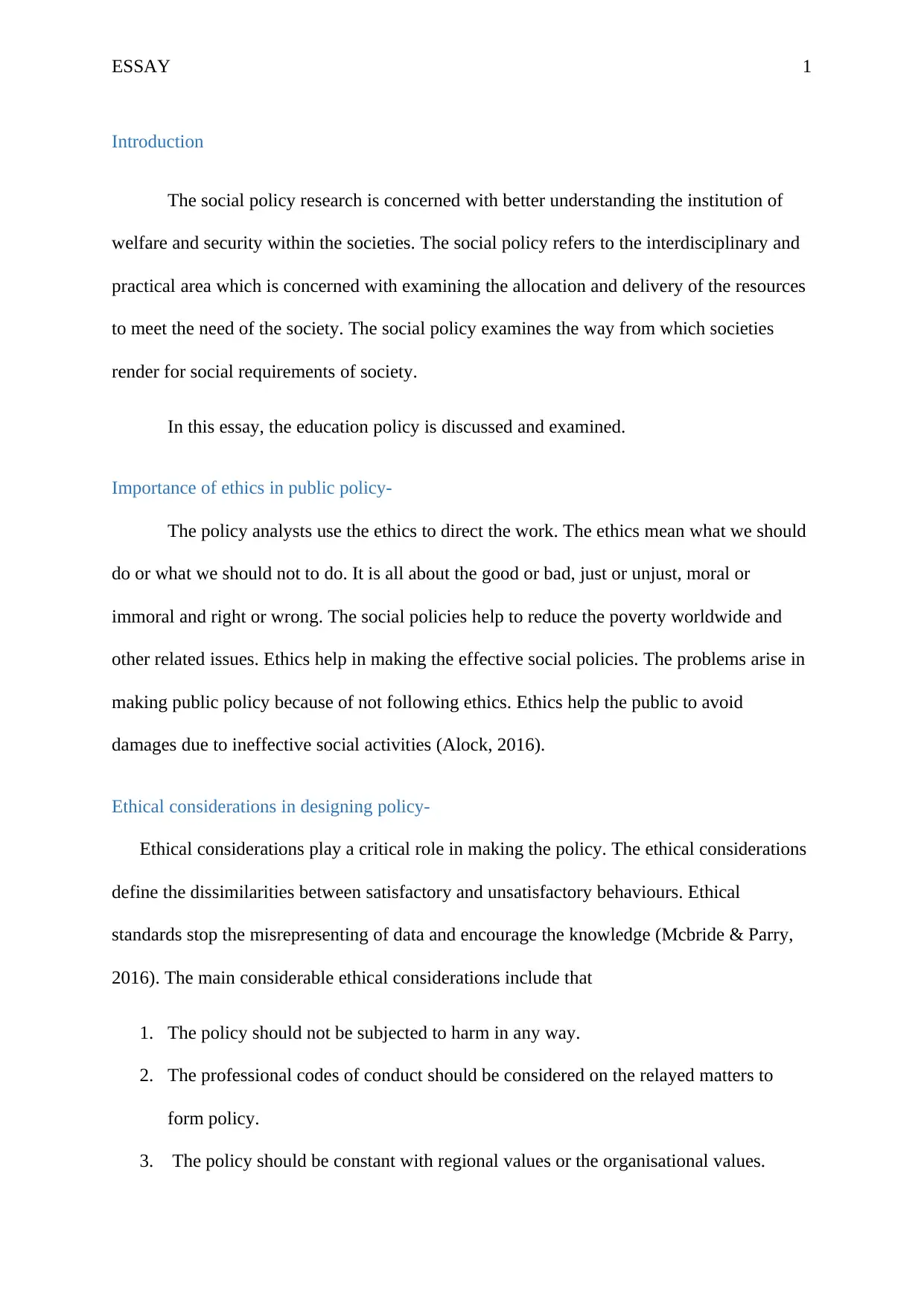
ESSAY 1
Introduction
The social policy research is concerned with better understanding the institution of
welfare and security within the societies. The social policy refers to the interdisciplinary and
practical area which is concerned with examining the allocation and delivery of the resources
to meet the need of the society. The social policy examines the way from which societies
render for social requirements of society.
In this essay, the education policy is discussed and examined.
Importance of ethics in public policy-
The policy analysts use the ethics to direct the work. The ethics mean what we should
do or what we should not to do. It is all about the good or bad, just or unjust, moral or
immoral and right or wrong. The social policies help to reduce the poverty worldwide and
other related issues. Ethics help in making the effective social policies. The problems arise in
making public policy because of not following ethics. Ethics help the public to avoid
damages due to ineffective social activities (Alock, 2016).
Ethical considerations in designing policy-
Ethical considerations play a critical role in making the policy. The ethical considerations
define the dissimilarities between satisfactory and unsatisfactory behaviours. Ethical
standards stop the misrepresenting of data and encourage the knowledge (Mcbride & Parry,
2016). The main considerable ethical considerations include that
1. The policy should not be subjected to harm in any way.
2. The professional codes of conduct should be considered on the relayed matters to
form policy.
3. The policy should be constant with regional values or the organisational values.
Introduction
The social policy research is concerned with better understanding the institution of
welfare and security within the societies. The social policy refers to the interdisciplinary and
practical area which is concerned with examining the allocation and delivery of the resources
to meet the need of the society. The social policy examines the way from which societies
render for social requirements of society.
In this essay, the education policy is discussed and examined.
Importance of ethics in public policy-
The policy analysts use the ethics to direct the work. The ethics mean what we should
do or what we should not to do. It is all about the good or bad, just or unjust, moral or
immoral and right or wrong. The social policies help to reduce the poverty worldwide and
other related issues. Ethics help in making the effective social policies. The problems arise in
making public policy because of not following ethics. Ethics help the public to avoid
damages due to ineffective social activities (Alock, 2016).
Ethical considerations in designing policy-
Ethical considerations play a critical role in making the policy. The ethical considerations
define the dissimilarities between satisfactory and unsatisfactory behaviours. Ethical
standards stop the misrepresenting of data and encourage the knowledge (Mcbride & Parry,
2016). The main considerable ethical considerations include that
1. The policy should not be subjected to harm in any way.
2. The professional codes of conduct should be considered on the relayed matters to
form policy.
3. The policy should be constant with regional values or the organisational values.
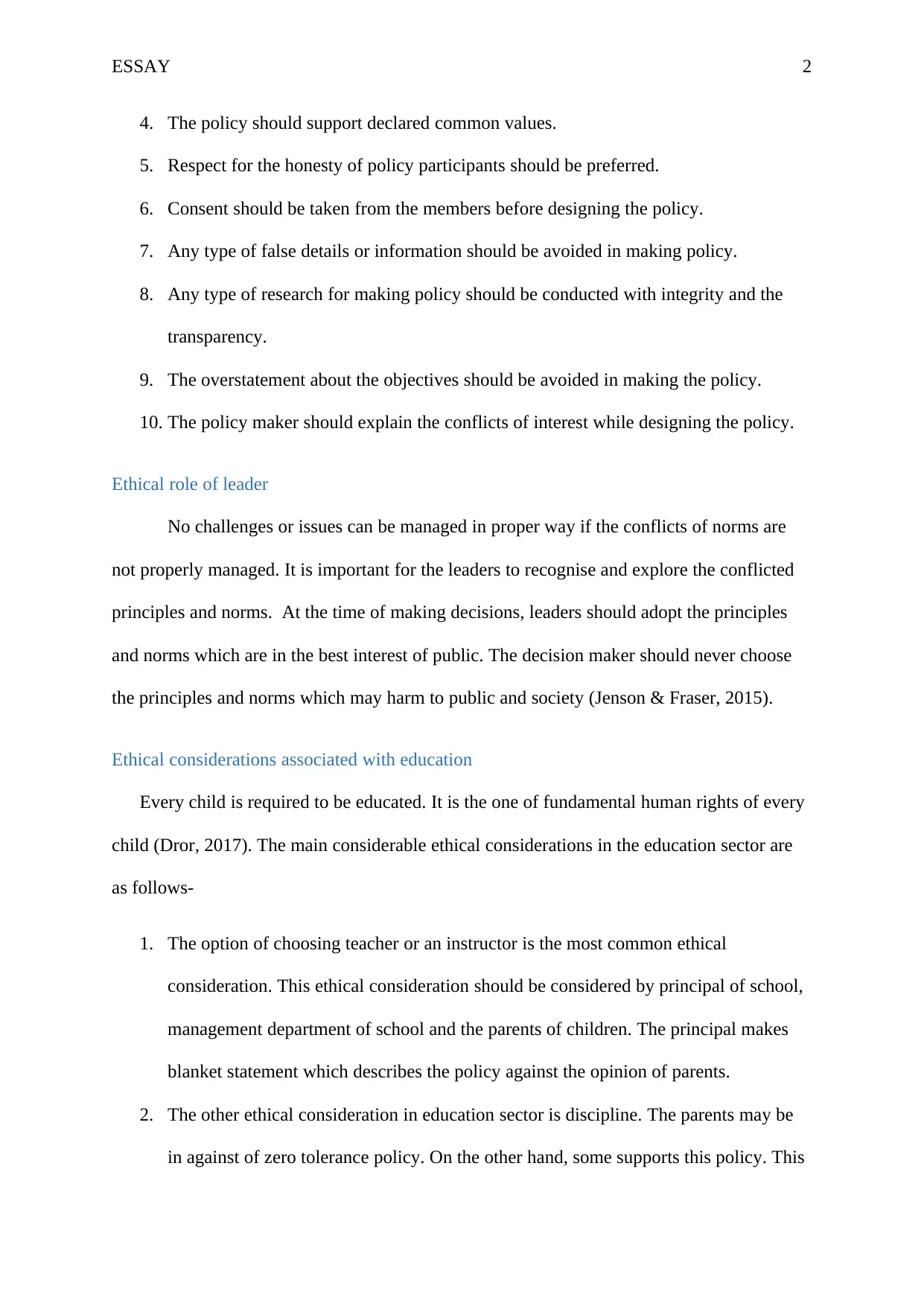
ESSAY 2
4. The policy should support declared common values.
5. Respect for the honesty of policy participants should be preferred.
6. Consent should be taken from the members before designing the policy.
7. Any type of false details or information should be avoided in making policy.
8. Any type of research for making policy should be conducted with integrity and the
transparency.
9. The overstatement about the objectives should be avoided in making the policy.
10. The policy maker should explain the conflicts of interest while designing the policy.
Ethical role of leader
No challenges or issues can be managed in proper way if the conflicts of norms are
not properly managed. It is important for the leaders to recognise and explore the conflicted
principles and norms. At the time of making decisions, leaders should adopt the principles
and norms which are in the best interest of public. The decision maker should never choose
the principles and norms which may harm to public and society (Jenson & Fraser, 2015).
Ethical considerations associated with education
Every child is required to be educated. It is the one of fundamental human rights of every
child (Dror, 2017). The main considerable ethical considerations in the education sector are
as follows-
1. The option of choosing teacher or an instructor is the most common ethical
consideration. This ethical consideration should be considered by principal of school,
management department of school and the parents of children. The principal makes
blanket statement which describes the policy against the opinion of parents.
2. The other ethical consideration in education sector is discipline. The parents may be
in against of zero tolerance policy. On the other hand, some supports this policy. This
4. The policy should support declared common values.
5. Respect for the honesty of policy participants should be preferred.
6. Consent should be taken from the members before designing the policy.
7. Any type of false details or information should be avoided in making policy.
8. Any type of research for making policy should be conducted with integrity and the
transparency.
9. The overstatement about the objectives should be avoided in making the policy.
10. The policy maker should explain the conflicts of interest while designing the policy.
Ethical role of leader
No challenges or issues can be managed in proper way if the conflicts of norms are
not properly managed. It is important for the leaders to recognise and explore the conflicted
principles and norms. At the time of making decisions, leaders should adopt the principles
and norms which are in the best interest of public. The decision maker should never choose
the principles and norms which may harm to public and society (Jenson & Fraser, 2015).
Ethical considerations associated with education
Every child is required to be educated. It is the one of fundamental human rights of every
child (Dror, 2017). The main considerable ethical considerations in the education sector are
as follows-
1. The option of choosing teacher or an instructor is the most common ethical
consideration. This ethical consideration should be considered by principal of school,
management department of school and the parents of children. The principal makes
blanket statement which describes the policy against the opinion of parents.
2. The other ethical consideration in education sector is discipline. The parents may be
in against of zero tolerance policy. On the other hand, some supports this policy. This
⊘ This is a preview!⊘
Do you want full access?
Subscribe today to unlock all pages.

Trusted by 1+ million students worldwide
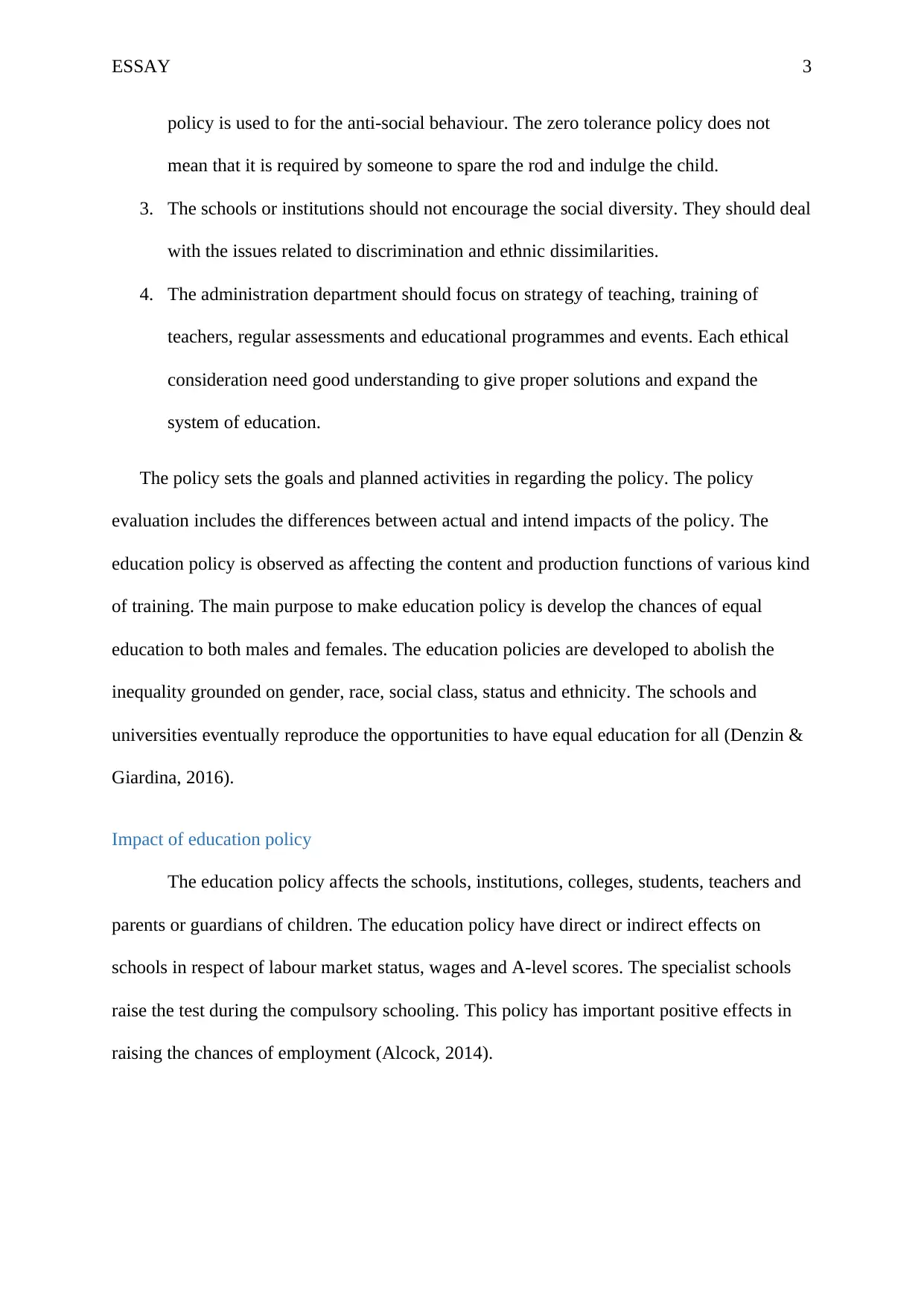
ESSAY 3
policy is used to for the anti-social behaviour. The zero tolerance policy does not
mean that it is required by someone to spare the rod and indulge the child.
3. The schools or institutions should not encourage the social diversity. They should deal
with the issues related to discrimination and ethnic dissimilarities.
4. The administration department should focus on strategy of teaching, training of
teachers, regular assessments and educational programmes and events. Each ethical
consideration need good understanding to give proper solutions and expand the
system of education.
The policy sets the goals and planned activities in regarding the policy. The policy
evaluation includes the differences between actual and intend impacts of the policy. The
education policy is observed as affecting the content and production functions of various kind
of training. The main purpose to make education policy is develop the chances of equal
education to both males and females. The education policies are developed to abolish the
inequality grounded on gender, race, social class, status and ethnicity. The schools and
universities eventually reproduce the opportunities to have equal education for all (Denzin &
Giardina, 2016).
Impact of education policy
The education policy affects the schools, institutions, colleges, students, teachers and
parents or guardians of children. The education policy have direct or indirect effects on
schools in respect of labour market status, wages and A-level scores. The specialist schools
raise the test during the compulsory schooling. This policy has important positive effects in
raising the chances of employment (Alcock, 2014).
policy is used to for the anti-social behaviour. The zero tolerance policy does not
mean that it is required by someone to spare the rod and indulge the child.
3. The schools or institutions should not encourage the social diversity. They should deal
with the issues related to discrimination and ethnic dissimilarities.
4. The administration department should focus on strategy of teaching, training of
teachers, regular assessments and educational programmes and events. Each ethical
consideration need good understanding to give proper solutions and expand the
system of education.
The policy sets the goals and planned activities in regarding the policy. The policy
evaluation includes the differences between actual and intend impacts of the policy. The
education policy is observed as affecting the content and production functions of various kind
of training. The main purpose to make education policy is develop the chances of equal
education to both males and females. The education policies are developed to abolish the
inequality grounded on gender, race, social class, status and ethnicity. The schools and
universities eventually reproduce the opportunities to have equal education for all (Denzin &
Giardina, 2016).
Impact of education policy
The education policy affects the schools, institutions, colleges, students, teachers and
parents or guardians of children. The education policy have direct or indirect effects on
schools in respect of labour market status, wages and A-level scores. The specialist schools
raise the test during the compulsory schooling. This policy has important positive effects in
raising the chances of employment (Alcock, 2014).
Paraphrase This Document
Need a fresh take? Get an instant paraphrase of this document with our AI Paraphraser
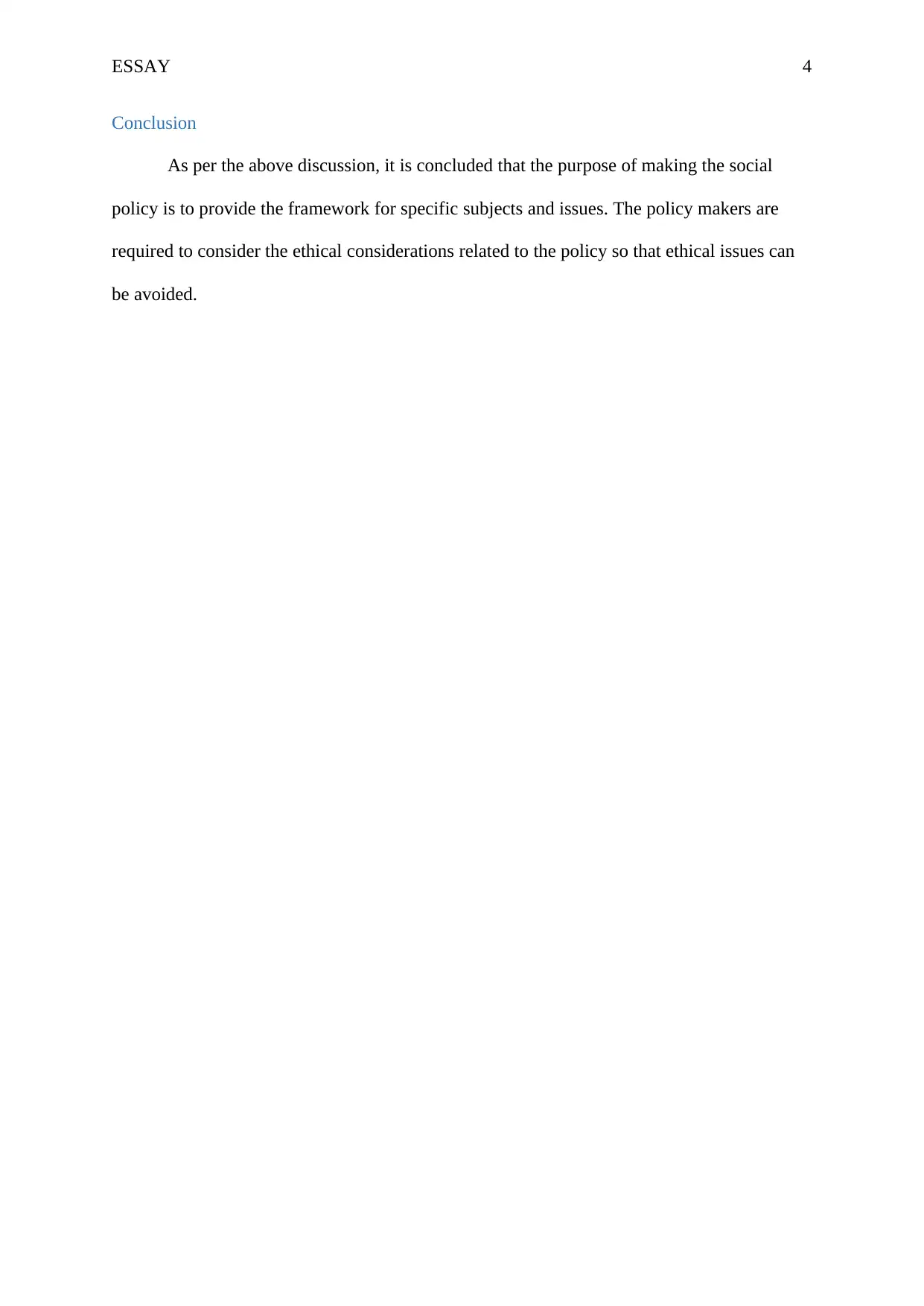
ESSAY 4
Conclusion
As per the above discussion, it is concluded that the purpose of making the social
policy is to provide the framework for specific subjects and issues. The policy makers are
required to consider the ethical considerations related to the policy so that ethical issues can
be avoided.
Conclusion
As per the above discussion, it is concluded that the purpose of making the social
policy is to provide the framework for specific subjects and issues. The policy makers are
required to consider the ethical considerations related to the policy so that ethical issues can
be avoided.
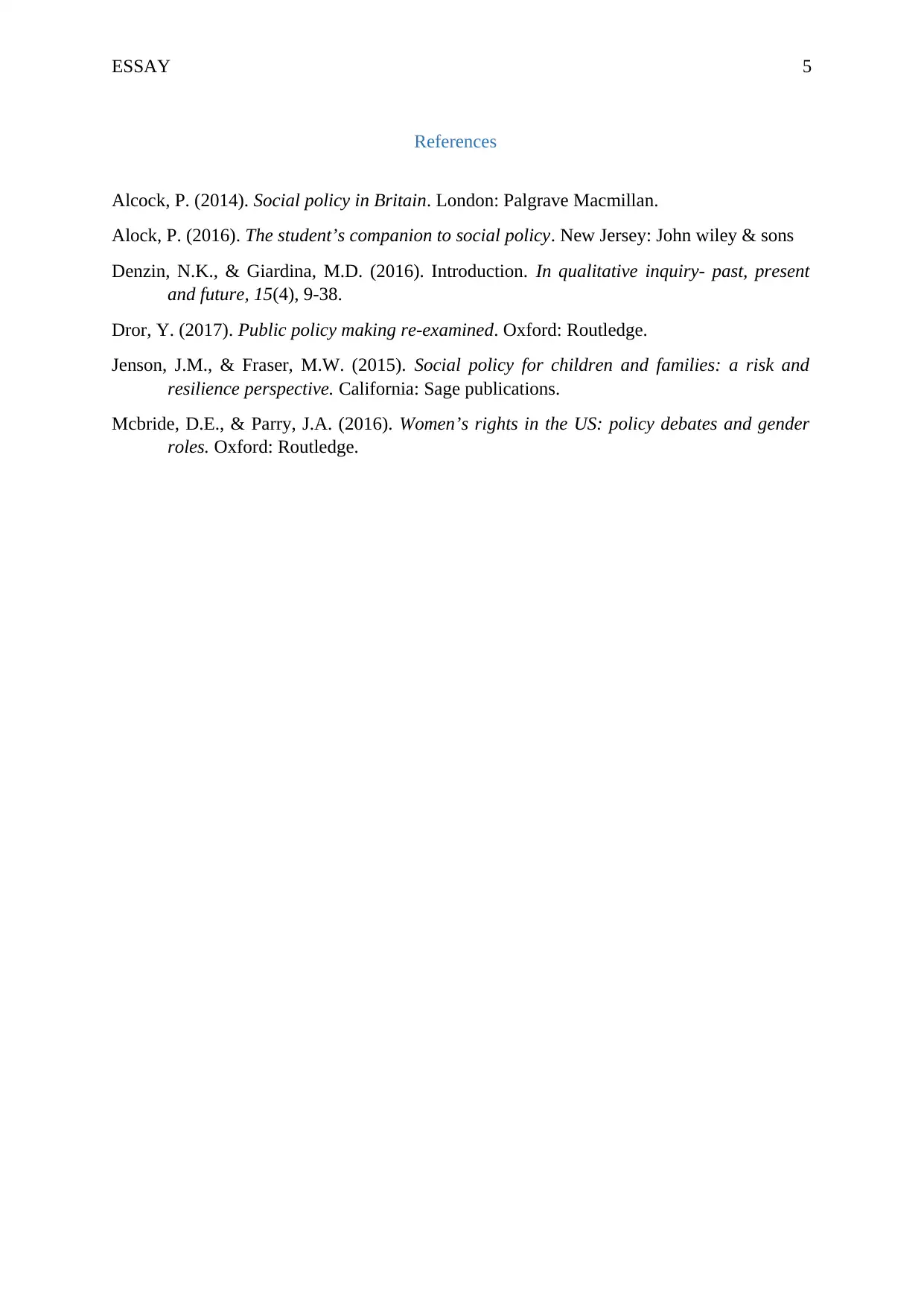
ESSAY 5
References
Alcock, P. (2014). Social policy in Britain. London: Palgrave Macmillan.
Alock, P. (2016). The student’s companion to social policy. New Jersey: John wiley & sons
Denzin, N.K., & Giardina, M.D. (2016). Introduction. In qualitative inquiry- past, present
and future, 15(4), 9-38.
Dror, Y. (2017). Public policy making re-examined. Oxford: Routledge.
Jenson, J.M., & Fraser, M.W. (2015). Social policy for children and families: a risk and
resilience perspective. California: Sage publications.
Mcbride, D.E., & Parry, J.A. (2016). Women’s rights in the US: policy debates and gender
roles. Oxford: Routledge.
References
Alcock, P. (2014). Social policy in Britain. London: Palgrave Macmillan.
Alock, P. (2016). The student’s companion to social policy. New Jersey: John wiley & sons
Denzin, N.K., & Giardina, M.D. (2016). Introduction. In qualitative inquiry- past, present
and future, 15(4), 9-38.
Dror, Y. (2017). Public policy making re-examined. Oxford: Routledge.
Jenson, J.M., & Fraser, M.W. (2015). Social policy for children and families: a risk and
resilience perspective. California: Sage publications.
Mcbride, D.E., & Parry, J.A. (2016). Women’s rights in the US: policy debates and gender
roles. Oxford: Routledge.
⊘ This is a preview!⊘
Do you want full access?
Subscribe today to unlock all pages.

Trusted by 1+ million students worldwide
1 out of 6
Related Documents
Your All-in-One AI-Powered Toolkit for Academic Success.
+13062052269
info@desklib.com
Available 24*7 on WhatsApp / Email
![[object Object]](/_next/static/media/star-bottom.7253800d.svg)
Unlock your academic potential
Copyright © 2020–2026 A2Z Services. All Rights Reserved. Developed and managed by ZUCOL.





